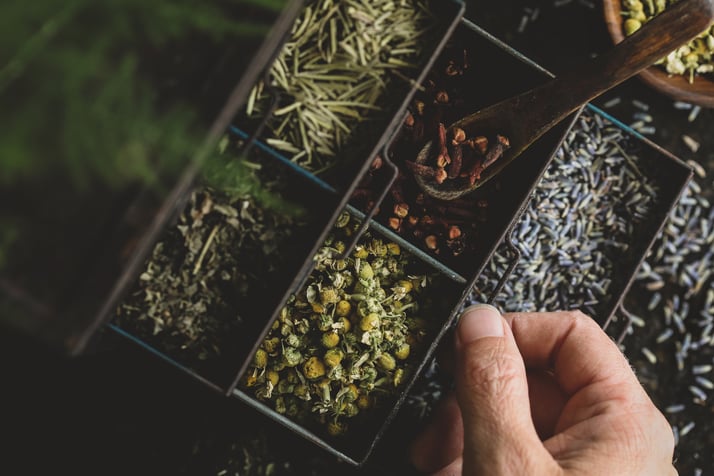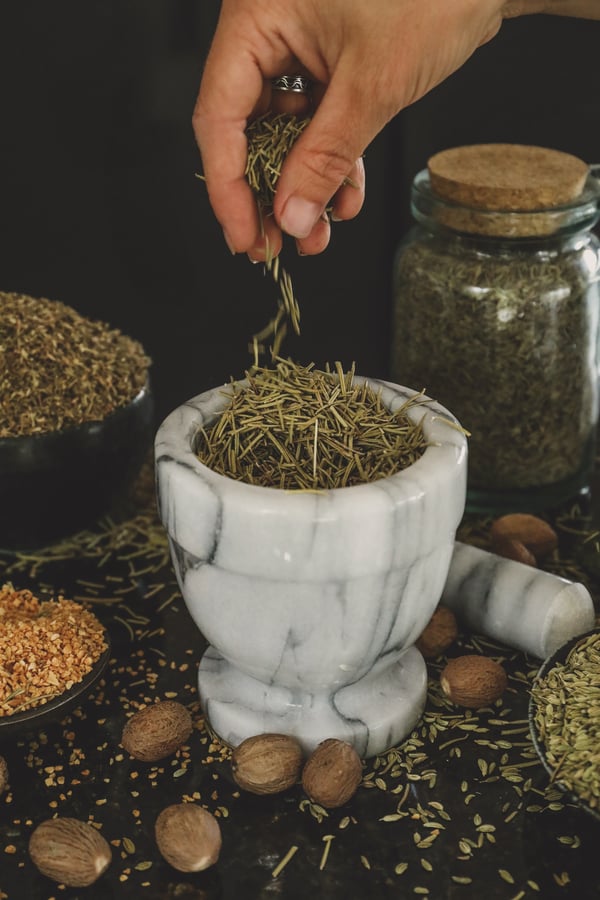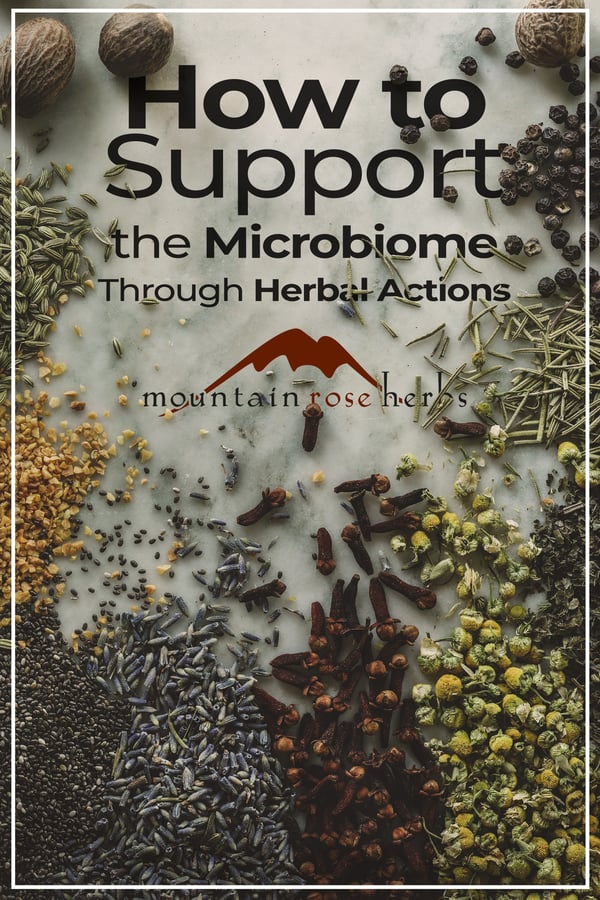We now know that microflorae in our gut, which have evolved in a symbiotic relationship with us over time, directly influence—either positively or negatively—every aspect of our health and wellbeing, including our digestion, immune functions, neurological and emotional health, hormonal balance, cardiovascular strength, and more. Attracting beneficial microflorae (the ones that flip the genetic switches toward health and balance) is a matter of making healthy food and lifestyle choices. In other words, what we eat tips the scales towards wellbeing or dis-ease. When we choose to eat an organic plant-based diet high in phytonutrients, antioxidants, and dietary fiber, we attract a much more diverse, healthy, and resilient microbiome, which in turn strengthens our defenses against illness and unhealthy aging. In this line of defense, carminative, nervine, bitter, and demulcent herbs can be leveraged much like secret agents who step in to fend off undesirable effects.
How Herbal Actions Support Gut Health
Herbal “actions” are a set of common terms that refer to the properties associated with particular herbs. Understanding these terms helps us determine proper use, informs us in formulation decisions, and presents us with options when we need to substitute one herb for another. Many times, a single herb will have a variety of actions, which can be key in feeding a healthy microbiome. In terms of positively influencing the microflorae in our gut, we are most interested in herbal actions that include carminative, nervine, bitter, and demulcent herbs.
Carminatives
Carminatives are aromatic herbs containing volatile oils. These small molecules help relieve intestinal gas, tension, and spasms and promote intestinal motility. They help the digestive process function smoothly and with ease. Use carminatives when there is gas, irritability, fluctuating stool frequency and/or consistency, bloating, cramps, or flatulence. Consider these carminative herbs:
- Organic anise
- Organic carraway
- Organic chamomile
- Organic cumin
- Organic coriander
- Organic clove
- Organic dill
- Organic fennel
- Organic garlic
- Organic ginger root
- Organic lemon balm
- Organic marjoram
- Organic motherwort
- Organic mustard
- Organic nutmeg
- Organic onion
- Organic orange
- Organic oregano
- Organic parsley
- Organic pepper
- Organic peppermint
- Organic rosemary
- Organic saffron
- Organic sage
- Organic savory
- Organic spearmint
- Organic thyme
- Organic triphala
- Organic valerian
- Organic wintergreen
- Organic wormwood
Nervines and Carminative/Nervines
Nervines are relaxing herbs that are often tonic or specifically supportive of the nervous system. Many of these herbs possess both carminative qualities that affect our digestive systems and nervine properties that ease stress and relax the nerves. The natural synergy in the plant makes these herbs particularly well-suited to problems involving the gut-brain axis. Consider these nervine herbs:
- Organic celery seed
- Organic chamomile
- Organic hawthorn
- Organic hyssop
- Organic lavender
- Organic lemon balm
- Organic peppermint
- Organic rosemary
- Organic valerian
Bitters
Bitters are stimulating to the secretions of the stomach, pancreas, liver, and small intestines, and they increase our ability to digest and assimilate our food. Use bitters when there is indigestion, heartburn, poor fat digestion, or constipation. Consider bitter/carminative and bitter/nervine herbs:
- Bitter/Carminative: organic turmeric, angelica, elecampane, wormwood, mugwort
- Bitter/Nervine: organic motherwort, blue vervain, hops, skullcap

Demulcent Herbs
Demulcents are "slimy," mucilaginous herbs. Made up of branched carbohydrate molecules that easily trap water and other molecules, which causes them to swell and become soft, they are high in polysaccharides-rich mucilage. Demulcents reinforce the intestinal mucous layer that is both food and home for beneficial microflora in the gut, and they also increase the numbers and diversity of beneficial microbiota. Demulcents have a soothing effect on contact throughout the entire digestive tract, and they also offer water-soluble fiber that bulks and softens stool. Use demulcents to support healthy bowel health and when any of the GI tract mucous membranes are irritated, from the throat on down. Consider these demulcent herbs:
- Organic chia seed
- Organic flaxseed
- Organic marshmallow root
- Organic oats, also a nervine
- Organic plantain leaves, roots, and seeds
- Organic slippery elm bark*
* Use sustainably sourced herb only. This plant is on United Plant Savers' At Risk list.
Simple Gut-Loving Drink for the Morning
Enough for one drink.
Ingredients:
- 1 Tbsp. organic marshmallow root powder or slippery elm bark powder
- 4 oz. pure, filtered water
- 1 Tbsp. freshly ground organic flax seed
Directions:
- Soak marshmallow root or slippery elm bark powder in water overnight.
- The next morning, add freshly ground flax seeds.
- Add mixture to a smoothie, or add another 4 ounces of water and drink as is.
When we have the foundational knowledge of herbal actions, we are better able to understand how and when to use our botanical allies. Calling upon a large list of herbs and spices that are carminatives, nervines, bitters, and/or demulcents can bring support to our microbiome. We know that much of our wellness is linked to balanced gut flora, so taking care of it is one of the best ways we can support our overall health.
I hope you enjoyed this series and now understand why the microbiome is so important and how to best support its optimal function.
LOOKING FOR PART ONE OF THIS SERIES?
Learn More About What the Microbiome Is and Why It's Important!
You may also be interested in:
Supporting the Microbiome Through Diet (Part 2)
Best Herbs for Digestion + 3 Easy Recipes
Guide to Basic Herbal Actions
* It is always recommended to check in with your personal health care provider when adding new herbs and supplements to your daily routine.




.png)








